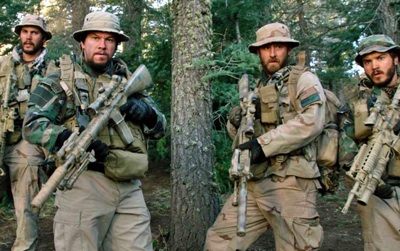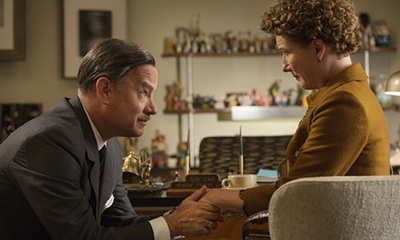 Have a holly jolly Christmas…except at the movies, where ’tis as always the season for tragedy: war, financial flim-flammery, Keanu Reeves. Grim up, enjoy.
Have a holly jolly Christmas…except at the movies, where ’tis as always the season for tragedy: war, financial flim-flammery, Keanu Reeves. Grim up, enjoy.
American Hustle: I remember the Abscam sting operation of the late 70s as a pallid affair, with wiretaps, entrapment, and a lot of whey-faced politicians caught with their hands in the cookie jar. A gray, Northeast, hungover, Sidney Lumet kind of deal. Not so for David O. Russell–for him, it’s a riot of big gaudy clothes and big gaudy hair, slathered with period tunes played nonstop, as if a disco inferno had exploded in my sister’s Barbie dollhouse of that era. Good times. The fetishization of the crap from my childhood (missing only the reams of velour I wore in the colder weather) is just one of the oddities of an aggressive but wearying sidelong glance at the affair, as seen from the POV of minor con artists (Christian Bale and Amy Adams) obliged by an on-the-make FBI agent (Bradley Cooper) to snag the mayor of Camden (Jeremy Renner), whose municipal cash flow problems are dwarfed by his Elvis pompadour. Along for the ride are Bale’s jilted wife (Jennifer Lawrence), from whom potential disaster is never far (her skirmish with a “science oven,” given as a gift by her cheating husband, is a comic highlight), Cooper’s increasingly aggravated boss (Louis C.K.), a questionably “Arab” agent (Michael Pena), and a bunch of schnooks, patsies, and goodfellas, all of whom bring the movie close to “lovable rogues” territory. Belatedly a theme emerges: The importance of “getting real,” as Adams’ character puts it, and the near-impossibility of doing so–her ex-stripper, who leads with her boobs, pretends to be English gentry as she contemplates trysting with Cooper’s tough-talking G-man, who curls his hair and lives with his mother, while Bale begins to feel protective of Renner, his mark. Their scenes together are the best in the movie, and the only ones that feel fully baked; the rest are sketchy, and held together by sheer adrenalin in the acting and editing. I loved The Fighter, and was glad to see Russell pop through commercially. Silver Linings Playbook was, however, a sentimental disaster (lots of likably “kooky” behavior substituting for character), and this is more of the same, if more palatable–is he working too quickly? Everything in it would have benefited from one more pass, including the title–how I hate the glib use of “American” to sledgehammer home irony. (And rather than go through all the trouble of making Bale look like Jason Schwartzman, why not just hire Jason Schwartzman?) But it’s going down like gangbusters, and referred to, with affection, as “Scorsese Lite.” I miss when Russell was simply Russell, and hope he gets real again soon.
 47 Ronin: As his Christmas Day release (the latest in a long line of Yuletide fantasy flops that I’ve experienced, as far back as 1976 and the first King Kong remake) suffers the death of a thousand snarky tweets, let’s give first-time director Carl Erik Rinsch the benefit of the doubt and assume he went into his megabudget production of a Japanese tale with the best of intentions. Let’s assume that, in referring to the film as “Kurosawa on meth,” he meant that he wanted to stay true to the tragic spirit of the story, translating it into muscular 300 terms for today’s audience. Let’s assume that his backers at Universal, questioning its international appeal, obliged him to cast a Western star as a “halfbreed, mongrel” lead, so he plucked Keanu Reeves, largely absent from the A list since his Matrix disappointments ten years ago, from his cryosleep. (We don’t have to assume that Reeves wasn’t fully roused from his slumber; that’s evident from the get-go, as he approaches everything from swordfights to love scenes as if in a trance.) Let’s assume that to further broaden the boxoffice of a fact-based storyline a decision was made to relocate it to “fantasy islands” in ancient feudal Japan, allowing supernatural elements (i.e. CGI wolf witches and a multi-eyed, multi-colored giant boar) to seep in. Let’s assume that Rinsch, realizing his original vision might be compromised by all this, said, “the classic versions of the story that Kenji Mizoguchi and Hiroshi Inagaki directed in Japan didn’t have CGI wolf witches and a multi-eyed, multi-colored giant boar,” and that the suits responded, “If those guys had the technology they would have put CGI wolf witches and a multi-eyed, multi-colored giant boar into their versions!” Let’s assume…well, I’m not sure what to assume. Perhaps Rinsch folded, realizing that the supernatural would give the characters a way out of their historical predicament, so he just went through the motions as the story was gutted of its timeless impact. Or maybe he went all in, seeing the have-it-both-ways finale as an opening to an Asian fantasy Lord of the Rings-type epic. It’s hard to tell, as many more poor decisions, from having the notable Japanese co-stars speak phonetic English, robbing them of their personality, to cloaking the thing in dreary, cheapening 3D, had an impact that a year’s worth of reshoots and delays couldn’t fix. I’m a sucker for this sort of thing (Reeves’ own movie, Man of Tai Chi, is decent martial arts fare, good for a video rental), but I was groanin’ during the listless, rudderless, two hours of 47 Ronin, and I assume–no, I know–that you have better things to do during your holiday.
47 Ronin: As his Christmas Day release (the latest in a long line of Yuletide fantasy flops that I’ve experienced, as far back as 1976 and the first King Kong remake) suffers the death of a thousand snarky tweets, let’s give first-time director Carl Erik Rinsch the benefit of the doubt and assume he went into his megabudget production of a Japanese tale with the best of intentions. Let’s assume that, in referring to the film as “Kurosawa on meth,” he meant that he wanted to stay true to the tragic spirit of the story, translating it into muscular 300 terms for today’s audience. Let’s assume that his backers at Universal, questioning its international appeal, obliged him to cast a Western star as a “halfbreed, mongrel” lead, so he plucked Keanu Reeves, largely absent from the A list since his Matrix disappointments ten years ago, from his cryosleep. (We don’t have to assume that Reeves wasn’t fully roused from his slumber; that’s evident from the get-go, as he approaches everything from swordfights to love scenes as if in a trance.) Let’s assume that to further broaden the boxoffice of a fact-based storyline a decision was made to relocate it to “fantasy islands” in ancient feudal Japan, allowing supernatural elements (i.e. CGI wolf witches and a multi-eyed, multi-colored giant boar) to seep in. Let’s assume that Rinsch, realizing his original vision might be compromised by all this, said, “the classic versions of the story that Kenji Mizoguchi and Hiroshi Inagaki directed in Japan didn’t have CGI wolf witches and a multi-eyed, multi-colored giant boar,” and that the suits responded, “If those guys had the technology they would have put CGI wolf witches and a multi-eyed, multi-colored giant boar into their versions!” Let’s assume…well, I’m not sure what to assume. Perhaps Rinsch folded, realizing that the supernatural would give the characters a way out of their historical predicament, so he just went through the motions as the story was gutted of its timeless impact. Or maybe he went all in, seeing the have-it-both-ways finale as an opening to an Asian fantasy Lord of the Rings-type epic. It’s hard to tell, as many more poor decisions, from having the notable Japanese co-stars speak phonetic English, robbing them of their personality, to cloaking the thing in dreary, cheapening 3D, had an impact that a year’s worth of reshoots and delays couldn’t fix. I’m a sucker for this sort of thing (Reeves’ own movie, Man of Tai Chi, is decent martial arts fare, good for a video rental), but I was groanin’ during the listless, rudderless, two hours of 47 Ronin, and I assume–no, I know–that you have better things to do during your holiday.
 Lone Survivor: An awards season hopeful, opening in limited release on Christmas Day, has been downgraded to another Mark Wahlberg movie opening nationwide in January (the 10th). That’s not the worse fate–last year’s Broken City, a city noir flop, is decent cable fare, and 2012’s Contraband was a hit. Clearly more was anticipated, though. In the tradition of Black Hawk Down (2001) comes the true story of a Navy SEAL mission in 2005 to assassinate a Taliban leader in Afghanistan that got FUBAR, with many casualties; surviving with grievous injuries, Marcus Luttrell (Wahlberg) is sheltered in a friendly Pashtun village that mobilizes to save him. An attempt to remold the handwringing, forgotten Iraq movies (In the Valley of Elah, Lions for Lambs, etc.) into something hard-headed but more supportive of our troops in the “good” war of Afghanistan begins shakily, with rah-rah music and editing and forced camaraderie among the soldiers; I couldn’t help but feel that the SEALs are better as backdrop, as in Zero Dark Thirty and Captain Phillips. As the mission intensifies so does interest, as the main SEAL contingent (credibly played by Wahlberg, Taylor Kitsch, Emile Hirsch, and Ben Foster) falls out over whether or not to kill the civilians who spot them. The film seems to be leaning uncomfortably in favor when all hell breaks loose and director Peter Berg (a veteran of “sand” movies, with The Kingdom on his resume) unleashes the big guns against his band of brothers, in grueling, bone-breaking, bullet-scarred combat scenes; plunges over ravines are particularly horrific (and act as correctives to the usual consequence-free action scenes we get). The third act, which should be the heart of the story as trust is established between Luttrell and the villagers, gets comparatively short shrift, however, with Wahlberg allowed at least one clichÁ© moment that goes against the grain the movie had earlier established. Clear-headed on some matters, Lone Survivor is muddled on others, and it doesn’t have much to say beyond reminding us of those who serve and sacrifice. Maybe that’s enough.
Lone Survivor: An awards season hopeful, opening in limited release on Christmas Day, has been downgraded to another Mark Wahlberg movie opening nationwide in January (the 10th). That’s not the worse fate–last year’s Broken City, a city noir flop, is decent cable fare, and 2012’s Contraband was a hit. Clearly more was anticipated, though. In the tradition of Black Hawk Down (2001) comes the true story of a Navy SEAL mission in 2005 to assassinate a Taliban leader in Afghanistan that got FUBAR, with many casualties; surviving with grievous injuries, Marcus Luttrell (Wahlberg) is sheltered in a friendly Pashtun village that mobilizes to save him. An attempt to remold the handwringing, forgotten Iraq movies (In the Valley of Elah, Lions for Lambs, etc.) into something hard-headed but more supportive of our troops in the “good” war of Afghanistan begins shakily, with rah-rah music and editing and forced camaraderie among the soldiers; I couldn’t help but feel that the SEALs are better as backdrop, as in Zero Dark Thirty and Captain Phillips. As the mission intensifies so does interest, as the main SEAL contingent (credibly played by Wahlberg, Taylor Kitsch, Emile Hirsch, and Ben Foster) falls out over whether or not to kill the civilians who spot them. The film seems to be leaning uncomfortably in favor when all hell breaks loose and director Peter Berg (a veteran of “sand” movies, with The Kingdom on his resume) unleashes the big guns against his band of brothers, in grueling, bone-breaking, bullet-scarred combat scenes; plunges over ravines are particularly horrific (and act as correctives to the usual consequence-free action scenes we get). The third act, which should be the heart of the story as trust is established between Luttrell and the villagers, gets comparatively short shrift, however, with Wahlberg allowed at least one clichÁ© moment that goes against the grain the movie had earlier established. Clear-headed on some matters, Lone Survivor is muddled on others, and it doesn’t have much to say beyond reminding us of those who serve and sacrifice. Maybe that’s enough.
 Philomena and Saving Mr. Banks: Spoonfuls of sugar helping the medicine go down. The mellowing effect takes more of a toll on Philomena, which caricatures its desperately determined title character, looking for the out-of-wedlock son she lost to Catholic Church adoption policies in Ireland, into an irrepressible, road-tripping old dear. Judi Dench could have wrung so much more from this true-life material, which was more harrowingly served by the docudrama The Magdalene Sisters (2002). But co-producer, co-writer, and co-star Steve Coogan, the last person I’d expect to succumb to the cutes, has, and there’s no backbone that director Stephen Frears can bring to it–he’s only as good as his scripts, which range from My Beautiful Laundrette (1986) to The Queen (2006), and this isn’t one of the good ones. Everything is blamed on one evil nun, rather than a corrupt system, which is how they avoided the ruffling of institutional feathers in old movies.
Philomena and Saving Mr. Banks: Spoonfuls of sugar helping the medicine go down. The mellowing effect takes more of a toll on Philomena, which caricatures its desperately determined title character, looking for the out-of-wedlock son she lost to Catholic Church adoption policies in Ireland, into an irrepressible, road-tripping old dear. Judi Dench could have wrung so much more from this true-life material, which was more harrowingly served by the docudrama The Magdalene Sisters (2002). But co-producer, co-writer, and co-star Steve Coogan, the last person I’d expect to succumb to the cutes, has, and there’s no backbone that director Stephen Frears can bring to it–he’s only as good as his scripts, which range from My Beautiful Laundrette (1986) to The Queen (2006), and this isn’t one of the good ones. Everything is blamed on one evil nun, rather than a corrupt system, which is how they avoided the ruffling of institutional feathers in old movies.
Speaking of old movies…Saving Mr. Banks joins My Week with Marilyn (2011) and last year’s Hitchcock as part of an awards season trend, movies-about-movies. (Add in the back-to-back Best Picture winners The Artist and Argo, movies about fictitious movies, and you’ve got a genre.) The target audience seems to be elder members of AMPAS, who are tickled by the nostalgia and don’t care too much how the business of dreams is distorted or fictionalized. Critics do. But I had fewer reservations than usual with Mr. Banks, which, being a Disney movie, can go a little deeper into the production specifics of Mary Poppins, a Disney movie, and make use of archival material (be sure to stay a bit through the end credits for a nice surprise). Contrast this with Marilyn, framed around the undistinguished The Prince and the Showgirl, or Hitchcock, which has to vamp in the absence of Psycho due to copyrights. The drawback, of course, is that being a Disney movie you’re not going to get anything hard-hitting about Walt Disney (Tom Hanks) and the fascinating P.L. Travers (Emma Thompson) as the film rights to Mary Poppins are tirelessly pursued. It all comes down to the daddy issues that both had, Travers in particular shaped and emotionally blocked by memories of her dad, a drunken banker (Colin Farrell)–and who better to get her onboard than that epitome of Middle American values, the actor who previously saved Private Ryan?
 It’s all a little easy–and easy to take, if the making of any movie is of sufficient interest to you. (Less moored to a particular title, The Artist and Argo can be about other things.) The criticism that Travers levels at a potential film of Mary Poppins–a treacly script, thin characterizations, wayward casting–can be leveled at Saving Mr. Banks (with all due respect to Farrell, an actor I respect, Australian he’s not). Yet the leads, again limited by the conception, are winning, and representing Team Disney are a charmingly abashed Paul Giamatti as Travers’ driver, Bradley Whitford as the put-upon co-writer of the adaptation, and a winsome Jason Schwartzman and B.J. Novak as those invaluable tunesmiths, the Sherman brothers. Resistance is futile, as they said in another, very different movie.
It’s all a little easy–and easy to take, if the making of any movie is of sufficient interest to you. (Less moored to a particular title, The Artist and Argo can be about other things.) The criticism that Travers levels at a potential film of Mary Poppins–a treacly script, thin characterizations, wayward casting–can be leveled at Saving Mr. Banks (with all due respect to Farrell, an actor I respect, Australian he’s not). Yet the leads, again limited by the conception, are winning, and representing Team Disney are a charmingly abashed Paul Giamatti as Travers’ driver, Bradley Whitford as the put-upon co-writer of the adaptation, and a winsome Jason Schwartzman and B.J. Novak as those invaluable tunesmiths, the Sherman brothers. Resistance is futile, as they said in another, very different movie.
One unambiguously good thing to come from Saving Mr. Banks is Mary Poppins itself, now on Blu-ray as its 50th anniversary approaches. In a new extra, Schwartzman chats with the Sherman he’s portraying, Richard, about both films, and there’s a sing-along feature as well. Retained from an earlier DVD is an engaging commentary track featuring stars Julie Andrews and Dick Van Dyke, the Shermans, and co-star Karen Dotrice, hours of period featurettes, a doc about the (middling, now closed) Broadway adaptation, and a live action/animated short featuring Andrews, The Cat that Looked at a King. Hugely impressive–and complementing a superior high-def rendering of the film, a lengthy but briskly paced, funny, and moving toe-tapper, to delight the proverbial children of all ages as never before on the small screen. Whatever Travers had to say, it’s still a jolly holiday.
Fighting further against the tide of cinematic depression, Disney has as well issued a pair of its Muppets movies as a double feature on Blu-ray, The Great Muppet Caper (1981) and Muppet Treasure Island (1996). The Of Pirates & Pigs Collection is a welcome two-fer with a lot of grins for family audiences. After the Oscar-, Grammy-, and Golden Globe-winning success of 1979’s The Muppet Movie, the England-set Caper, the only Muppet film directed by Jim Henson, was considered something of a disappointment, skewing a little older and concentrating a bit too heavily on a subplot partnering Miss Piggy with jewel thief Charles Grodin. Now that I’m older it’s held up fine, with the likes of Diana Rigg, John Cleese, and Peter Falk adding to the musical mystery fun, and that one neat number (“Couldn’t We Ride”) that puts the whole gang on bikes.
By 1996 I had aged out (or felt I had aged out) of the Muppets, and I didn’t see Treasure Island until now. As my kids can attest it’s a hoot, thanks in no small part to Tim Curry’s swashbuckling contribution as Long John Silver. (Jennifer Saunders and Billy Connolly, always good company, keep the human end up as well.) It was a decent hit (1999’s followup Muppets from Space, a flop, ended the franchise filmically until the 2011 revival) and like The Muppet Christmas Carol (1992) it does well to adhere to the original story, with Muppet embroidery and songs, of course. Piggy patrons, however, will be disappointed by her relative lack of screen time.
Blu-ray aficionados will be disapppointed by an only adequate hi-def rendering for both films, which don’t have much “pop” over the DVDs included in the package. Treasure Island gets a few extras, ported over from a prior DVD, and that’s about it for what amounts to a stocking stuffer. More effort might have gone into this set, but the films amuse as we wait for next year’s Muppets Most Wanted.





Comments